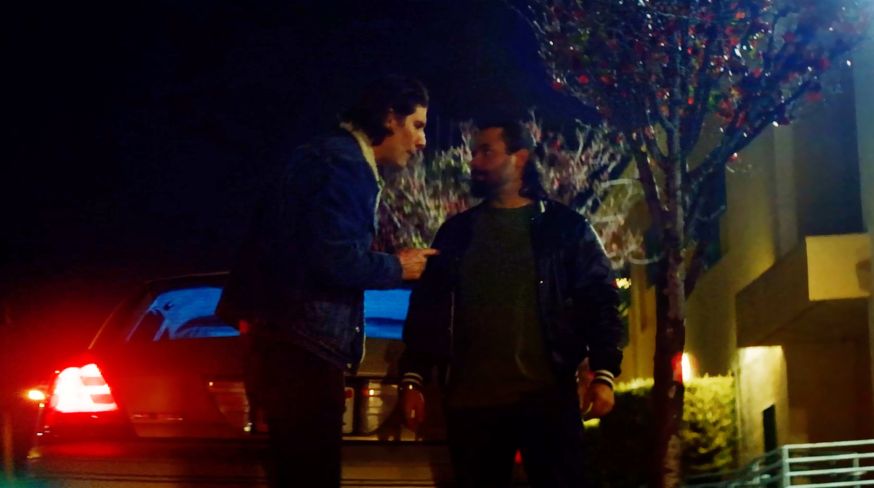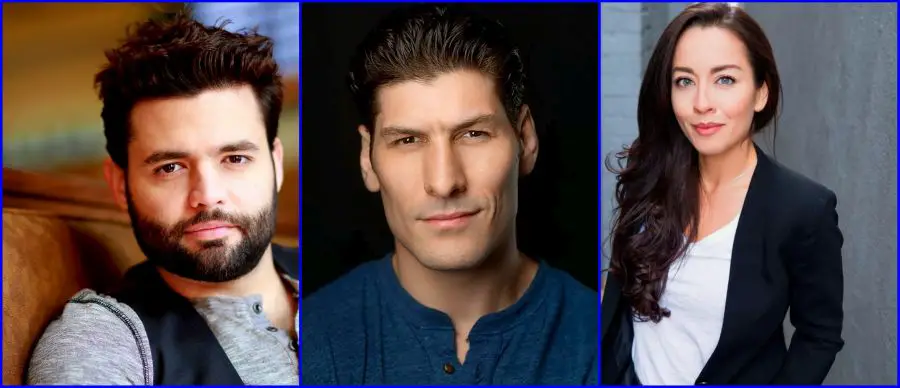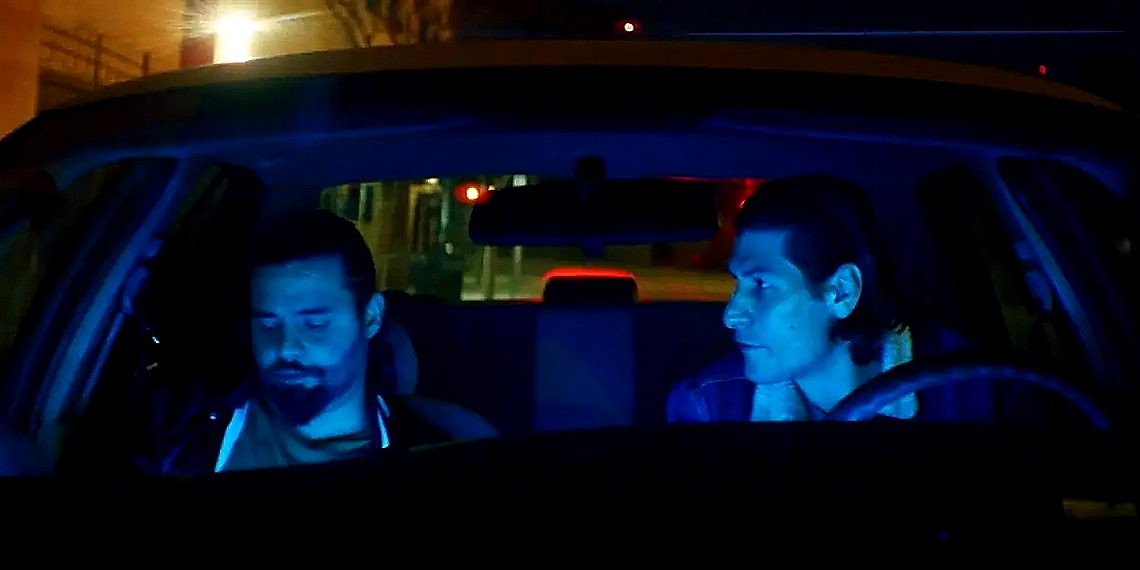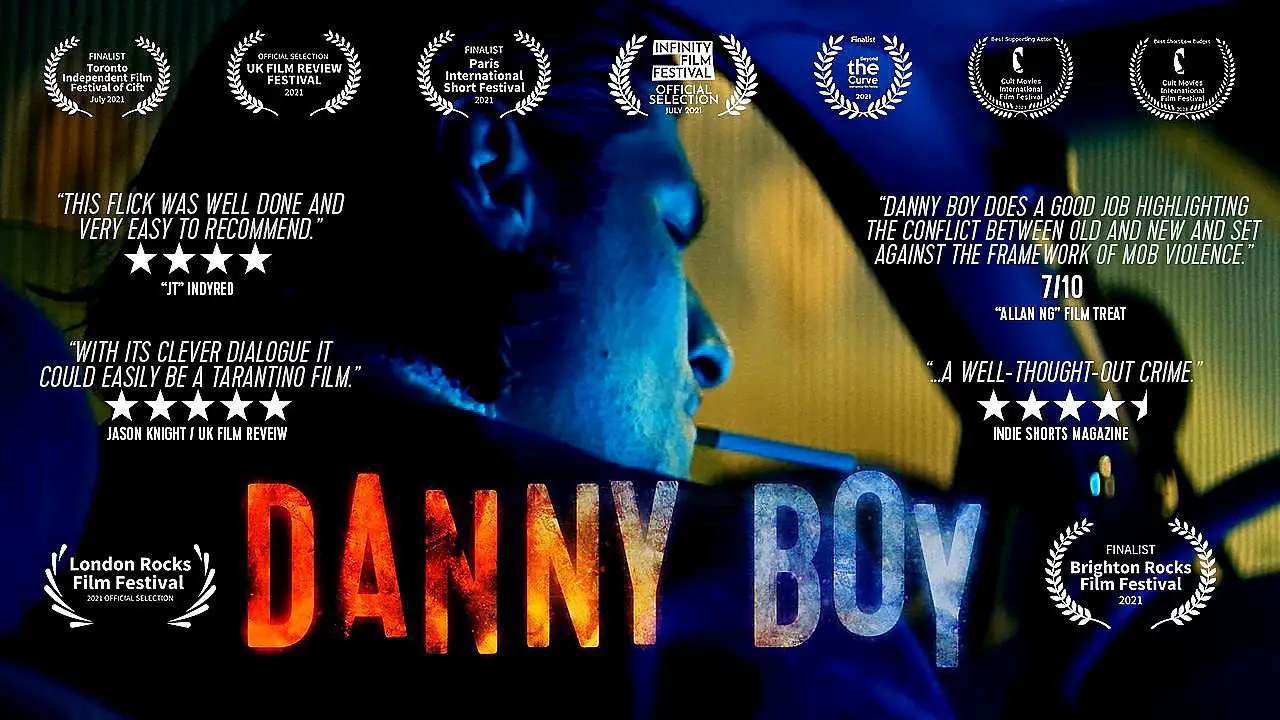Cory DeMeyers, a former Red Bull world champion athlete-turned-stuntman, is the recipient of the 2020 Taurus World Stunt Awards for his work on Quentin Tarantino’s Academy Award-nominated film, Once Upon a Time in Hollywood. Now he makes his directorial debut with the short film Danny Boy. Danny Boy (shot in 4.5hrs in Downtown Los Angeles this past February) was written by Sammy Horowitz, a former criminal, gang member and substance misuser who is now thriving in the film industry. Drawing inspiration from the directors DeMeyers admires (Quentin Tarantino, Martin Scorsese & Guy Richie), Danny Boy is a fitting homage to those filmmakers yet also stands as an original Los Angeles crime thriller. DeMeyers spoke to us just as Danny Boy had been selected at the Academy Qualifying HOLLYSHORTS film festival. Read on to find out how Cory transitioned from stunt performing to filmmaking and storytelling while working on big Hollywood sets…
Jason: Can you begin by telling us about your background, as it’s not everybody who is drawn to the world of stunt performing and I’m always curious by those who choose to pursue the profession.
Cory DeMeyers: I was teaching martial arts when I moved to California, and around that time (I) discovered Parkour on YouTube and went down that rabbit hole, wanting to make a living doing that, and the only way that was possible was to teach it or do it in film, television and commercials, which was the path I followed. I booked a few commercials and found my boss was a stunt coordinator and, with my background in martial arts and Parkour, fit together to allow me to pursue the stunt side of the industry.
Jason: Along with your journey in the stunt world, I understand you also fell in love with the art of storytelling? How do the two connect with you?
Cory DeMeyers: I’ve always been a fan of film and cinema and love a wonderful story. During the first part of my stunt career, I was excited to be a part of what we were doing in the stunt departments. I was paying attention to what the directors were doing and how the DP was working. But I wasn’t so much following the story until I worked on 300: Rise of an Empire, and I watched how intimately the stunt coordinator was working with Zack Snyder. He was involved in the storytelling, not just the action. I had a mentor, Kevin Scott, a stunt coordinator who did Peter Berg’s Lone Survivor. He told me actions should drive the story and stories should drive the action. That made me make sure that things we were putting on camera were driving the story forward.
Jason: Is there a particular stunt you’re most proud of?
Cory DeMeyers: There’s two, and the first one was the first time I ever worked with Kevin Scott. I got hired to do a Parkour sequence on Mile 22, jumping out of a second-story window down to a balcony and then falling off that balcony, falling through the bannister down to the ground. I doubled one of the Russian agents in the opening sequence of the movie. Before we come to shoot, I found out I was going to be set on fire and blown up as I jumped out of the window. That was the first big thing I did that made me feel like a stuntman. And then on Once Upon a Time in Hollywood, I worked with Quentin Tarantino and his stunt department. Fifty-two seconds in the opening sequence, the black and white footage of Bounty Law, I did a high fall off the roof of a building on the Western set. That was a very proud moment for me. I won a Taurus World Stunt award for that stunt, so those would be the two I’m the most proud of.
Jason: Do you want to talk a little about the development of this short, Danny Boy, which I liked very much.
Cory DeMeyers: Thank you. Danny Boy was a project formed by Sammy Horowitz, our writer and actor who played Frances. He was writing more and wanted to get something on camera and I wanted to direct. We came up with a story that allowed us to showcase our talents, but also allowed me to make a narrative, dialogue-driven piece. People often think of stunt performers as the action guys, and that’s true. I have a good handle on shooting and directing action, but I wanted to challenge myself to grow in other areas. So we came up with this concept of these two criminals and a car. We wanted to do the trunk shot Tarantino does as a homage and we do a trunk shot in it, but it’s not the way he shoots it, and everybody shoots it the way Tarantino shoots it. We did the trunk thing but made it our own.

Jason: The actual shoot only took 4 1/2 hours, yet the project was many years in the making. Can you elaborate on the lengthy process?
Cory DeMeyers: We volleyed back and forth and allowed (Danny Boy) to develop. Then It sat on the shelf for about two years before we shot it. We were training a lot and in between work. Sammy started booking projects, I started booking projects that took me out for months at a time. And then the pandemic happened. So we had a year of work in the way and then a year of pandemic which, with Danny Boy, was a blessing because by the time we were ready to pull the trigger, the streets of L.A. were not busy at all. We could steal our locations while nobody was out running around. It worked out in our favor in the end.
Jason: You isolate these two characters and nobody else around and they’re in their own little world and you don’t know if you’re coming into the middle of another story and I liked that. With combining all the other components—style, execution, script, directing—how did you balance that all?
Cory DeMeyers: I thought about this story for the last two and a half years, so I knew how I would accomplish it. Throughout the years of working as a stunt performer and coordinator on commercials and music videos, I’ve built a lot of good bridges. I love what I do, and I think that shows in the final product of any project I’ve been on. When you’re at work, you’re enjoying what you’re doing, you’re jibing with cast and crew. I was in Los Angeles for work for nine days and I had about two days off in February of this year, and I said ‘Hey, let’s let’s do this if we can pull the crew together.’ I had a great relationship with the sound mixer I had worked with on a few projects. My friend was a camera operator and is moving into being a director of photography. It was 10 pages, so I felt we could accomplish it in a night. From working on minor projects over the years, I’ve gotten my feet wet with color correction and post sound design editing. I have a pretty wonderful knowledge of all of those different aspects. I was in New Orleans on a Netflix feature film as the stunt coordinator, then every night I’d go home and get on the phone and blast emails. But I work well under pressure. I enjoy being busy. So balancing It all wasn’t hard. It was fun.
Jason: It’s a quick-paced short; even though there isn’t a lot of action, the fast pace is in the dialogue. And I like the color scheme. Was that color scheme your vision?
Cory DeMeyers: It was (director of photography) Deangelo Harding’s suggestion. It didn’t have to be real color. We were trying to be stylistic. It’s a movie, right? There’s room to have fun. There’re some things that are based in reality in this film, but also it gave us an opportunity to be creative. Blue is a very communicative color. If we were to light it real, it would have been too hot. They would have been too hot in the car and (it) wouldn’t have felt like nighttime. The blue light allowed you to still feel the presence of night while allowing you to see the characters and give it a little something extra. We did the same thing with the red and the trunk, right? That was the counter to the blue. The red is a little more intense, and it’s a very intense moment in the film where we see that red.
Jason: it’s hard to make Los Angeles look original, and I felt that’s what you did.
Cory DeMeyers: Our director of photography is going to love that. Color correction pulled those colors out much more. We wanted it to have a vintage feel. Even though this is a digital piece, if we color it in that way, it really makes the city feel good and it pulls the Reds out, even in the cigarette or in the lights on the street.

Jason: How much was based on real conversations you or the screenwriter might have had with other people? Is there much of that?
Cory DeMeyers: Danny and Francis were based on people that both Sam and I have known in our own lives. I grew up in a middle-class neighborhood outside of Flint. I knew a lot of guys that were small-time crooks and harbouring secrets of their own. Maybe who they were as a person wasn’t accepted in the other circles in their life that they ran with. Sam knew those guys, too. He was involved in criminal organizations for 15 years of his life before he could leave that behind and start anew. So there is truth in everything Sam writes. It doesn’t have to be true 100%, but they’re based on actual people and or actual experience. I would say those characters are true to people that are known in those circles and Sam had come across.
Jason: Is there any way you can compare being a stunt man and stunt work to directing?
Cory DeMeyers: The level of preparation that you take on as a stuntman or coordinator or performer is directly relatable to directing a film in that preparation is key. It’s very important to know what you’re trying to accomplish and have a plan that you’re executing. But sometimes things don’t always go as planned, and that’s OK. You adapt and adjust to that situation to continue to move the picture forward. As a director, we had a plan going into it, yet there are little things we noticed that weren’t working and had to adjust. Having a plan and executing that plan is really important on both sides of the industry, but also being open enough to make changes. Being a dictator doesn’t work in either situation. You have to adapt, adjust, listen to your cast and crew and then your job is to be discerning with that information and make a decision so everybody can move forward.

Jason: Do you want to continue to choose projects which reflect, you know, our culture today?
Cory DeMeyers: I do and I don’t. We all have our own beliefs and there is a better way to move forward together in the current climate. I don’t want to always take a stance but I want to challenge people to think about both sides of an issue, In order to make things comfortable in your position, you have to be open to seeing and listening to the other side of things. I have several projects in mind for the future that are a commentary on things that are happening today. The challenge for me is, I want to tell those stories and pose those questions in interesting ways. I think there’s a very in-your-face way to do things that aren’t always accepted by both sides, but I think there’s a way to get everybody to pay attention to two issues if they’re done through the medium of film. In Danny Boy, you rarely see these two types of men through this lens and I think that’s how you get more people involved in conversations is by making sure that the setting is interesting.
Jason: Did you know those two actors before you worked together on this; did they know each other?
Cory DeMeyers: They had never worked together before, but they have trained together. You know, Jet has been a friend of mine for, man, over 10 years. I met him the day he moved to Los Angeles. Sam, I met on a film called Notorious Nick, which came out. We met on that film because he was a stunt actor playing the main bad guy in the movie, and we hit it off. The two of them worked well together. I’m very proud of them in their performances, and I think they’re very proud of each other.
Jason: They should be. They’re great. Is there anything else you want to add or clue up or talk about?
Cory DeMeyers: Everybody, mostly, that has watched it has been very receptive and enjoyed the film on some level. The festival film festival world is crazy, and we’ve noticed Europe was very open to our film. We were turned down by 15 festivals in the United States. And I think the current political climate right now over the last five years has made people a little nervous to touch this subject. Everybody’s tiptoeing around these issues and nobody wants to get in trouble. We just want to tell honest stories and we’re risky filmmakers. I will not make something just because that’s what I’m told to make.
Jason: Is the final product what you set (it) out to be? Did it change at any point along the way? Was there stuff left or cut out?
Cory DeMeyers: I think our original intention is there. There was a comedic beat that was taken out. Danny has a line where he says, ‘Man, I could have gone for that doughnut right now,’ Sam and I had powerful feelings about that. The film was originally titled Donuts and was supposed to be a little lighter. But when we got into it and Jansen Fernandez, who plays Danny, felt It was too funny and I thought, as the director, ‘I’m not trying to make a comedy.’ There was no way to deliver that line straight. It was funny every single time and I think that took us away from some issues that the film speaks on.
Jason: Is it fun to flip the expectations on an audience, like, they’re probably coming in thinking they’re getting a heist movie, but they’re also getting this like sort of commentary at the same time?
Cory DeMeyers: It’s a blast. I think those are the movies that I enjoy, which is why I want to continue to make films, whether they’re short films or feature films that do that. I like things that make you think and flip expectations on their head and surprise the audience. I like challenging the audience. It’s a little film with heart, is what I keep saying; even though these guys are criminals, there are some very poignant things that are happening. There’s some serious commentary in here about life, love, loyalty, acceptance, judging a book by its cover. I’m making people care about a criminal in ways they thought they couldn’t, and it opens people’s minds. There’s another film I have in the works called Choices and it’s very investigative and challenges people to care about others in a way they wouldn’t normally. I like that. I want people to talk about it and start conversations around these things.

For more information on Danny Boy, visit www.dannyboytheshortfilm.com


